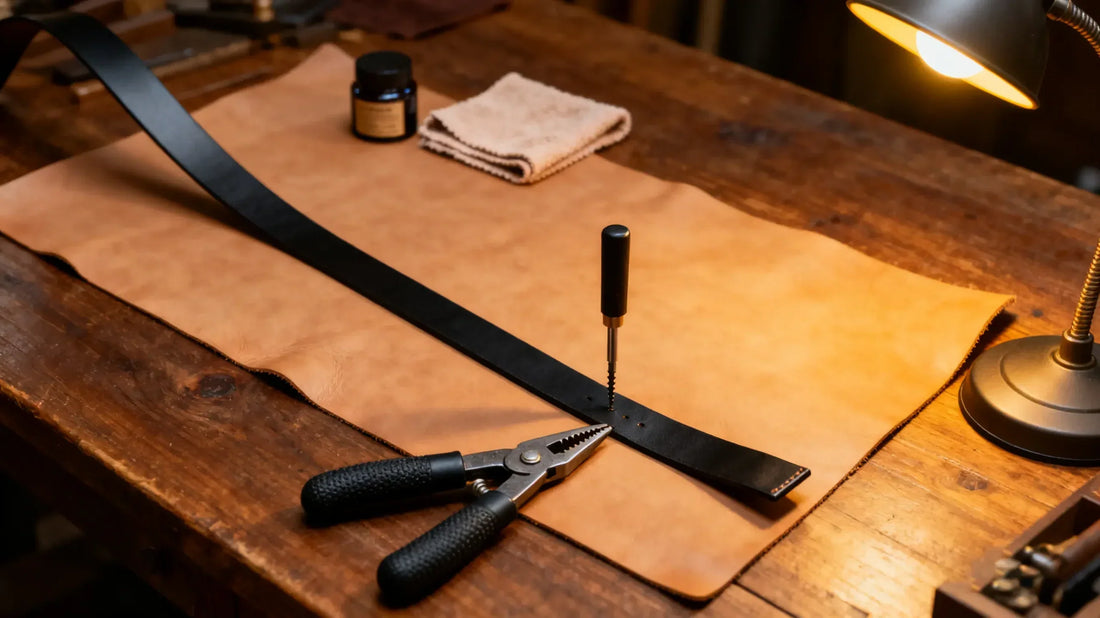
Stop Damaging Your Belts! How to Make a Hole in a Belt
Share
Introduction
We’ve all been there: your favorite belt doesn’t quite fit anymore, and you’re tempted to grab a knife, scissors, or anything sharp to punch a hole. But wait! Improperly making holes can ruin your belt’s structure and appearance. If you’re wondering how to make a hole in a belt the right way, this guide will walk you through safe and effective methods without damaging your accessory.
Table of Contents
1.Why You Might Need a New Hole in Your Belt
2.Tools You Can Use to Make a Hole in a Belt
3.Step-by-Step Guide: How to Make a Hole in a Belt
4.DIY Alternatives Without Professional Tools
5.Mistakes to Avoid When Making Belt Holes
6.Caring for Your Belt After Making a Hole
7.When to Replace Instead of Punching Holes
8.FAQs on How to Make a Hole in a Belt
9.Conclusion
1. Why You Might Need a New Hole in Your Belt
Belts are designed with about five holes spaced evenly apart. But sometimes that’s not enough. You might need an extra hole if:
You’ve gained or lost weight.
Your belt has stretched over time.
You want a tighter or looser fit for a different outfit.
👉 Browse our leather belts collection for belts designed with extra durability and adjustable holes.
2. Tools You Can Use to Make a Hole in a Belt
The safest way to add a hole is with the right tool:
Leather hole punch: The best and most precise tool, available in multiple sizes.
Drill with leather bit: Effective for thicker belts but requires care.
Awl or sharp nail: Works in a pinch but less precise.
Go to view the appropriate punching tool: The Spruce Crafts – How to Punch a Hole in a Leather Belt
3. Step-by-Step Guide: How to Make a Hole in a Belt
Follow these steps for a clean and professional result:
Measure properly: Wear the belt and mark the spot where the new hole should go.
Align with existing holes: Make sure the spacing matches the original pattern (usually 1 inch apart).
Punch the hole: Use a leather punch or other chosen tool, applying firm and steady pressure.
Finish the edges: If necessary, sand or trim rough edges for a neat finish.
4. DIY Alternatives Without Professional Tools
Don’t have a leather punch? Here are some DIY solutions:
Heated nail or screwdriver: Heat the tip and carefully push through the belt (better for synthetic belts).
Sharp scissors or knife: Can work but may create jagged edges.
Drill: Works well for tough leather but requires steady control.
⚠️ Warning: These methods may reduce the belt’s lifespan — use them only in emergencies.
5. Mistakes to Avoid When Making Belt Holes
Using oversized tools: Creates uneven holes.
Punching too close to the edge: Weakens the belt and risks tearing.
Making multiple random holes: Looks sloppy and ruins style.
Skipping measurements: Results in crooked alignment.
6. Caring for Your Belt After Making a Hole
After creating a new hole, extend your belt’s life by:
Conditioning leather with a balm or oil to prevent cracking.
Avoiding over-tightening, which stresses the new hole.
Storing your belt flat or rolled, not folded.
7. When to Replace Instead of Punching Holes
Sometimes, it’s better to buy a new belt:
If your belt already looks worn out.
If multiple extra holes are needed.
If the belt material is cracking or tearing.
Think of belts as both functional and stylish. Investing in a new one can upgrade your wardrobe.
8. FAQs on How to Make a Hole in a Belt
Q1: What’s the best tool to make a hole in a belt?
A leather hole punch is the safest and cleanest option.
Q2: Can I use a drill to make a hole in a belt?
Yes, but only with care and a leather-specific bit.
Q3: How far apart should belt holes be?
Typically about 1 inch apart for consistency.
Q4: Can I make a hole in a synthetic belt?
Yes, but use heat (like a hot nail) to prevent fraying.
Q5: Will punching a hole ruin my belt?
Not if done correctly with the right tools and spacing.
Conclusion
Learning how to make a hole in a belt the right way ensures your belt stays stylish and functional for years. Avoid common mistakes, use the right tools, and treat your belt with care afterward.
Ready for a better fit? Explore our leather belts collection and upgrade to belts designed with durability and adjustable comfort.
Don’t just fix your belt — perfect it. A well-fitted belt is the ultimate finishing touch to your outfit.
